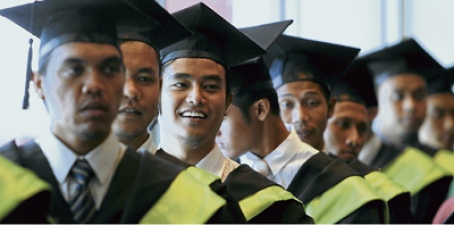Social engagement, the third mission
Professor Tan Sri Dato' Dzulkifli Abdul Razak
Learning Curve: Perspective
New Sunday Times - 28-04-2013
AIMS OF UNIVERSITIES: Promote teaching-learning, research and civic responsibility

It is incumbent on universities to ensure that their graduates become socially responsible citizens.
TWENTY years ago, the world was presented with a controversial idea called "the clash of civilisations".
In 1993, the late Samuel Huntington published an essay, The Clash of Civilizations?, in Foreign Affairs. It was later expanded into a book of the same title and a thesis which hypothesised that the post-Cold War would be marked by civilisational conflict.
Huntington wrote: "It is my hypothesis that the fundamental source of conflict in this new world will not be primarily ideological or primarily economic.
"The great divisions among humankind and the dominating source of conflict will be cultural. Nation states will remain the most powerful actors in world affairs, but the principal conflicts of global politics will occur between nations and groups of different civilisations.
"The clash of civilisations will dominate global politics. The fault lines between civilisations will be the battle lines of the future."
There is allegedly no continuum in universal civilisation, but rather it is divided along distinct cultural compartments shaped by their different sets of values.
There seems to be no intermingling among them, only to result in tensions.
Shared common values that underline them are disregarded. Instead, differences are refocused in negative ways, especially when they are at odds with Western-centric models.
The Riyadh Conference Statement presented at the conclusion of the recent International Conference And Exhibition On Higher Education is refreshing against this background.
Among others, it recognises the university's obligation to diversity and multiculturalism, and the promotion of human rights and civic responsibility.
"In an age where political conflict continues in most world regions and where peace is threatened at national, regional and even global levels, universities must instil into their students an understanding of and an appreciation and respect for diverse cultures, a desire to assist those with fewer advantages and greater personal challenges than themselves, and the recognition of their role in making society (and the larger world) a better place to live in."
The conference, which was organised by the Ministry of Higher Education of Saudi Arabia for the fourth time, saw more than 500 tertiary institutions around the world participating in it.
The theme was The Social Responsibility Of Universities, defined as the obligation to represent and practise a set of principles and values through its core functions of teaching, research, community engagement and institutional management.
Higher education institutions were urged to embed international dimensions in the curricula and encourage student exchanges in other countries.
Universities can help to promote greater multicultural understanding and intercultural skills.
While Science and Technology courses are important for a modern economy, Social Sciences and Humanities are equally essential, especially in the long-term.
These are closely linked to one central aspect of social responsibilities of universities, namely the development of productive and responsible citizens.
"Encouraging broad-based participation in civil society and the development of skills and attitudes to do so is of central importance to higher education."
This is often labelled the "third mission" though it is not intended as an add-on to the other two missions of teaching-learning and research. Instead, it is an integral part that cuts across tertiary -- if not lifelong -- education.
"This element of higher education is a critical part of the university's commitment to the larger society and important to the educational experience of each student.
"Yet, this dimension of higher education is rarely evident in the curriculum and requires the cultivation of non-cognitive skills that are not generally contemplated in programme design."
The statement appropriately concluded with an urgent reminder that the planet stands at a critical juncture -- environmentally, politically and economically, and the future will be determined by decisions made by individual societies.
Universities have the responsibility to contribute to knowledge and intellectual capacity that will promote healthier societies and a healthier planet; they must consider their social responsibility as a major guiding principle in all their core functions.
As universities train future leaders and decision-makers, it is incumbent on them to ensure that their graduates become socially responsible citizens and resist the influences of commercialisation and commodification brought about by globalisation that tend to divert institutions from their critical roles as social entities.
Responding to short-term market demands therefore must not overwhelm the institution's missions at the expense of its responsibility for long-term societal needs.
With such a progressive long-term view of education, the chances to enhance universal collaboration are more assured than any idea based on "clashes" underpinned by competition and greed.
- The writer is the vice-chancellor of the Albukhary International University
